Freedom vs. Law: A Deep Dive into Crime and Punishment by Dostoevsky
VerifiedAdded on 2022/07/28
|6
|1418
|82
Essay
AI Summary
This essay provides an in-depth analysis of Fyodor Dostoevsky's 'Crime and Punishment', focusing on the interplay between freedom and law, and how these concepts shape the protagonist Raskolnikov's actions and moral dilemmas. The essay explores Raskolnikov's aspiration for freedom, the consequences of his crime, and the subsequent internal conflict he experiences. It examines the subjective nature of freedom as opposed to the constraints of societal laws, drawing on the views of various scholars to illuminate Dostoevsky's exploration of human psyche, morality, and the journey towards redemption. The essay highlights the significance of conscience, remorse, and the role of Sonya in Raskolnikov's transformation, ultimately concluding that true freedom lies in aligning one's actions with a sense of good. The essay uses scholarly sources to support its arguments and provide a comprehensive understanding of the novel's core themes.
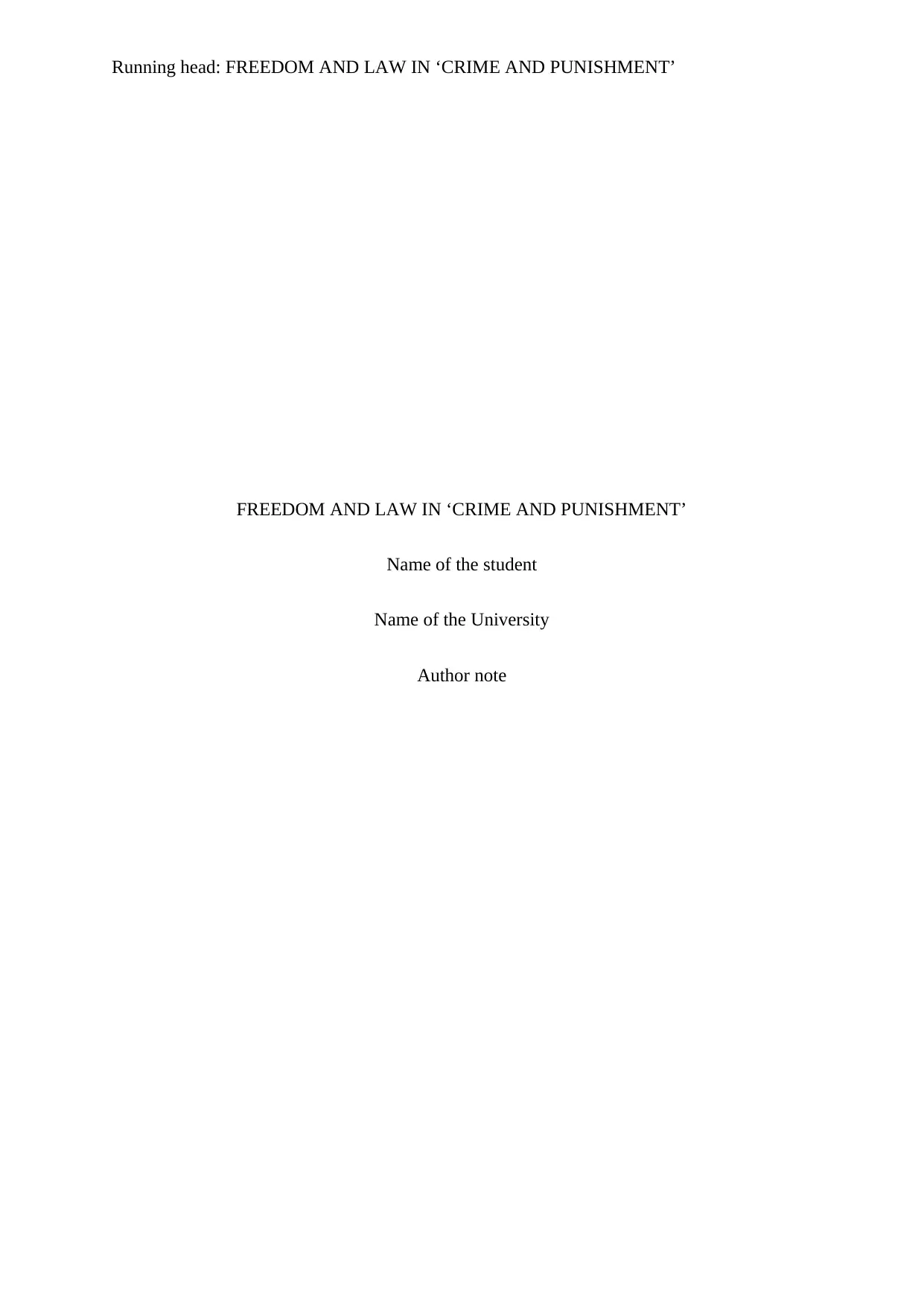
Running head: FREEDOM AND LAW IN ‘CRIME AND PUNISHMENT’
FREEDOM AND LAW IN ‘CRIME AND PUNISHMENT’
Name of the student
Name of the University
Author note
FREEDOM AND LAW IN ‘CRIME AND PUNISHMENT’
Name of the student
Name of the University
Author note
Paraphrase This Document
Need a fresh take? Get an instant paraphrase of this document with our AI Paraphraser
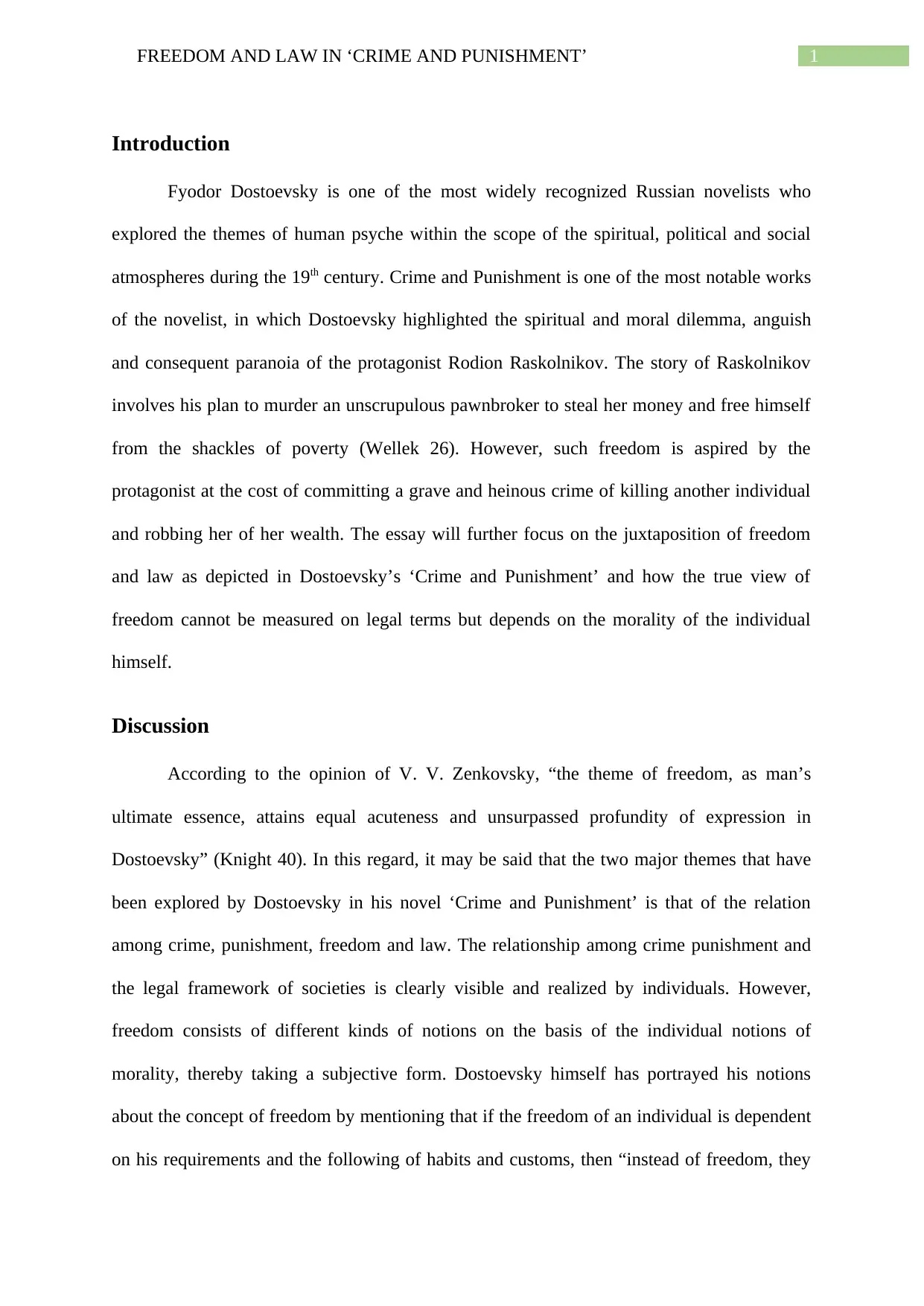
1FREEDOM AND LAW IN ‘CRIME AND PUNISHMENT’
Introduction
Fyodor Dostoevsky is one of the most widely recognized Russian novelists who
explored the themes of human psyche within the scope of the spiritual, political and social
atmospheres during the 19th century. Crime and Punishment is one of the most notable works
of the novelist, in which Dostoevsky highlighted the spiritual and moral dilemma, anguish
and consequent paranoia of the protagonist Rodion Raskolnikov. The story of Raskolnikov
involves his plan to murder an unscrupulous pawnbroker to steal her money and free himself
from the shackles of poverty (Wellek 26). However, such freedom is aspired by the
protagonist at the cost of committing a grave and heinous crime of killing another individual
and robbing her of her wealth. The essay will further focus on the juxtaposition of freedom
and law as depicted in Dostoevsky’s ‘Crime and Punishment’ and how the true view of
freedom cannot be measured on legal terms but depends on the morality of the individual
himself.
Discussion
According to the opinion of V. V. Zenkovsky, “the theme of freedom, as man’s
ultimate essence, attains equal acuteness and unsurpassed profundity of expression in
Dostoevsky” (Knight 40). In this regard, it may be said that the two major themes that have
been explored by Dostoevsky in his novel ‘Crime and Punishment’ is that of the relation
among crime, punishment, freedom and law. The relationship among crime punishment and
the legal framework of societies is clearly visible and realized by individuals. However,
freedom consists of different kinds of notions on the basis of the individual notions of
morality, thereby taking a subjective form. Dostoevsky himself has portrayed his notions
about the concept of freedom by mentioning that if the freedom of an individual is dependent
on his requirements and the following of habits and customs, then “instead of freedom, they
Introduction
Fyodor Dostoevsky is one of the most widely recognized Russian novelists who
explored the themes of human psyche within the scope of the spiritual, political and social
atmospheres during the 19th century. Crime and Punishment is one of the most notable works
of the novelist, in which Dostoevsky highlighted the spiritual and moral dilemma, anguish
and consequent paranoia of the protagonist Rodion Raskolnikov. The story of Raskolnikov
involves his plan to murder an unscrupulous pawnbroker to steal her money and free himself
from the shackles of poverty (Wellek 26). However, such freedom is aspired by the
protagonist at the cost of committing a grave and heinous crime of killing another individual
and robbing her of her wealth. The essay will further focus on the juxtaposition of freedom
and law as depicted in Dostoevsky’s ‘Crime and Punishment’ and how the true view of
freedom cannot be measured on legal terms but depends on the morality of the individual
himself.
Discussion
According to the opinion of V. V. Zenkovsky, “the theme of freedom, as man’s
ultimate essence, attains equal acuteness and unsurpassed profundity of expression in
Dostoevsky” (Knight 40). In this regard, it may be said that the two major themes that have
been explored by Dostoevsky in his novel ‘Crime and Punishment’ is that of the relation
among crime, punishment, freedom and law. The relationship among crime punishment and
the legal framework of societies is clearly visible and realized by individuals. However,
freedom consists of different kinds of notions on the basis of the individual notions of
morality, thereby taking a subjective form. Dostoevsky himself has portrayed his notions
about the concept of freedom by mentioning that if the freedom of an individual is dependent
on his requirements and the following of habits and customs, then “instead of freedom, they
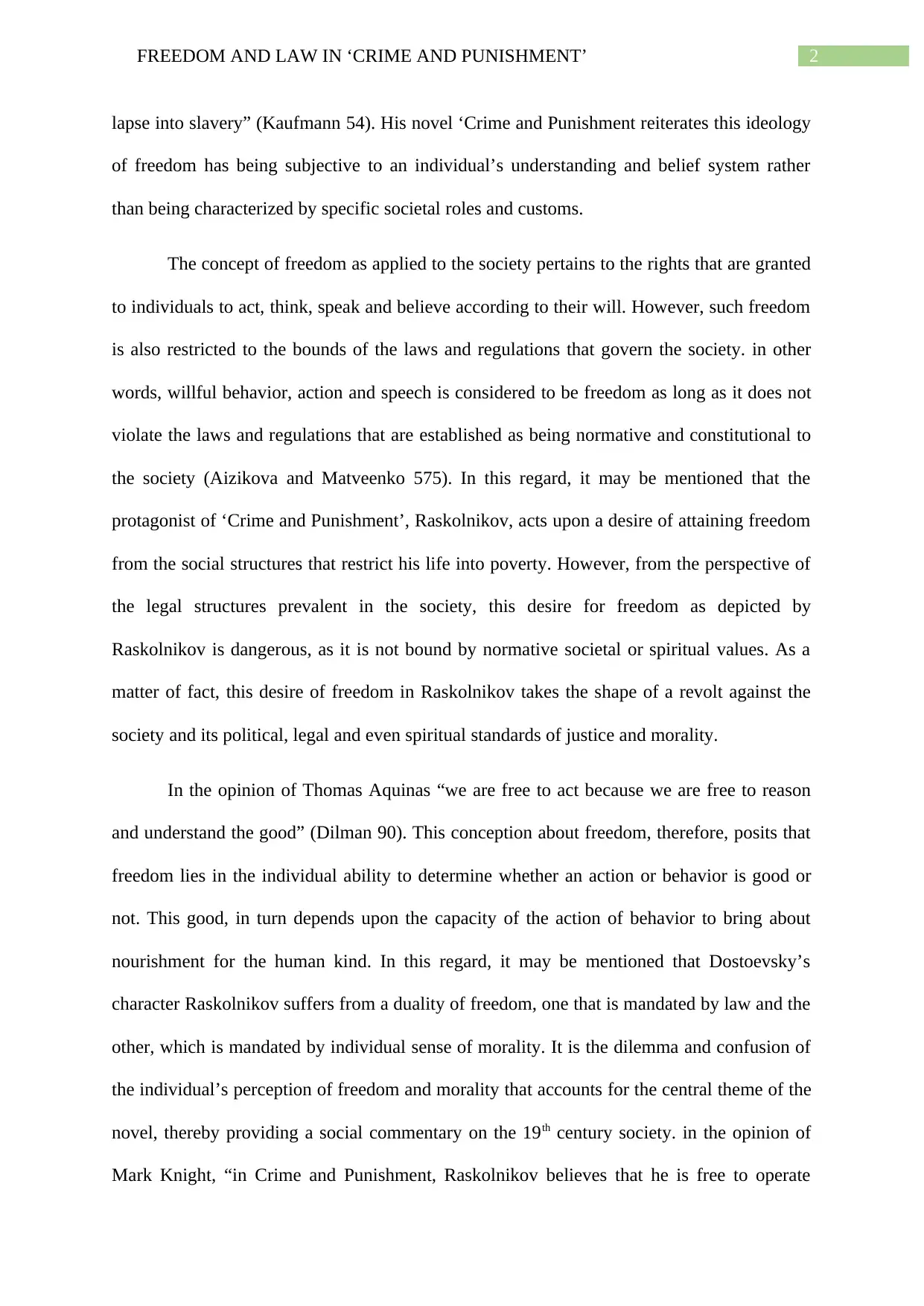
2FREEDOM AND LAW IN ‘CRIME AND PUNISHMENT’
lapse into slavery” (Kaufmann 54). His novel ‘Crime and Punishment reiterates this ideology
of freedom has being subjective to an individual’s understanding and belief system rather
than being characterized by specific societal roles and customs.
The concept of freedom as applied to the society pertains to the rights that are granted
to individuals to act, think, speak and believe according to their will. However, such freedom
is also restricted to the bounds of the laws and regulations that govern the society. in other
words, willful behavior, action and speech is considered to be freedom as long as it does not
violate the laws and regulations that are established as being normative and constitutional to
the society (Aizikova and Matveenko 575). In this regard, it may be mentioned that the
protagonist of ‘Crime and Punishment’, Raskolnikov, acts upon a desire of attaining freedom
from the social structures that restrict his life into poverty. However, from the perspective of
the legal structures prevalent in the society, this desire for freedom as depicted by
Raskolnikov is dangerous, as it is not bound by normative societal or spiritual values. As a
matter of fact, this desire of freedom in Raskolnikov takes the shape of a revolt against the
society and its political, legal and even spiritual standards of justice and morality.
In the opinion of Thomas Aquinas “we are free to act because we are free to reason
and understand the good” (Dilman 90). This conception about freedom, therefore, posits that
freedom lies in the individual ability to determine whether an action or behavior is good or
not. This good, in turn depends upon the capacity of the action of behavior to bring about
nourishment for the human kind. In this regard, it may be mentioned that Dostoevsky’s
character Raskolnikov suffers from a duality of freedom, one that is mandated by law and the
other, which is mandated by individual sense of morality. It is the dilemma and confusion of
the individual’s perception of freedom and morality that accounts for the central theme of the
novel, thereby providing a social commentary on the 19th century society. in the opinion of
Mark Knight, “in Crime and Punishment, Raskolnikov believes that he is free to operate
lapse into slavery” (Kaufmann 54). His novel ‘Crime and Punishment reiterates this ideology
of freedom has being subjective to an individual’s understanding and belief system rather
than being characterized by specific societal roles and customs.
The concept of freedom as applied to the society pertains to the rights that are granted
to individuals to act, think, speak and believe according to their will. However, such freedom
is also restricted to the bounds of the laws and regulations that govern the society. in other
words, willful behavior, action and speech is considered to be freedom as long as it does not
violate the laws and regulations that are established as being normative and constitutional to
the society (Aizikova and Matveenko 575). In this regard, it may be mentioned that the
protagonist of ‘Crime and Punishment’, Raskolnikov, acts upon a desire of attaining freedom
from the social structures that restrict his life into poverty. However, from the perspective of
the legal structures prevalent in the society, this desire for freedom as depicted by
Raskolnikov is dangerous, as it is not bound by normative societal or spiritual values. As a
matter of fact, this desire of freedom in Raskolnikov takes the shape of a revolt against the
society and its political, legal and even spiritual standards of justice and morality.
In the opinion of Thomas Aquinas “we are free to act because we are free to reason
and understand the good” (Dilman 90). This conception about freedom, therefore, posits that
freedom lies in the individual ability to determine whether an action or behavior is good or
not. This good, in turn depends upon the capacity of the action of behavior to bring about
nourishment for the human kind. In this regard, it may be mentioned that Dostoevsky’s
character Raskolnikov suffers from a duality of freedom, one that is mandated by law and the
other, which is mandated by individual sense of morality. It is the dilemma and confusion of
the individual’s perception of freedom and morality that accounts for the central theme of the
novel, thereby providing a social commentary on the 19th century society. in the opinion of
Mark Knight, “in Crime and Punishment, Raskolnikov believes that he is free to operate
⊘ This is a preview!⊘
Do you want full access?
Subscribe today to unlock all pages.

Trusted by 1+ million students worldwide
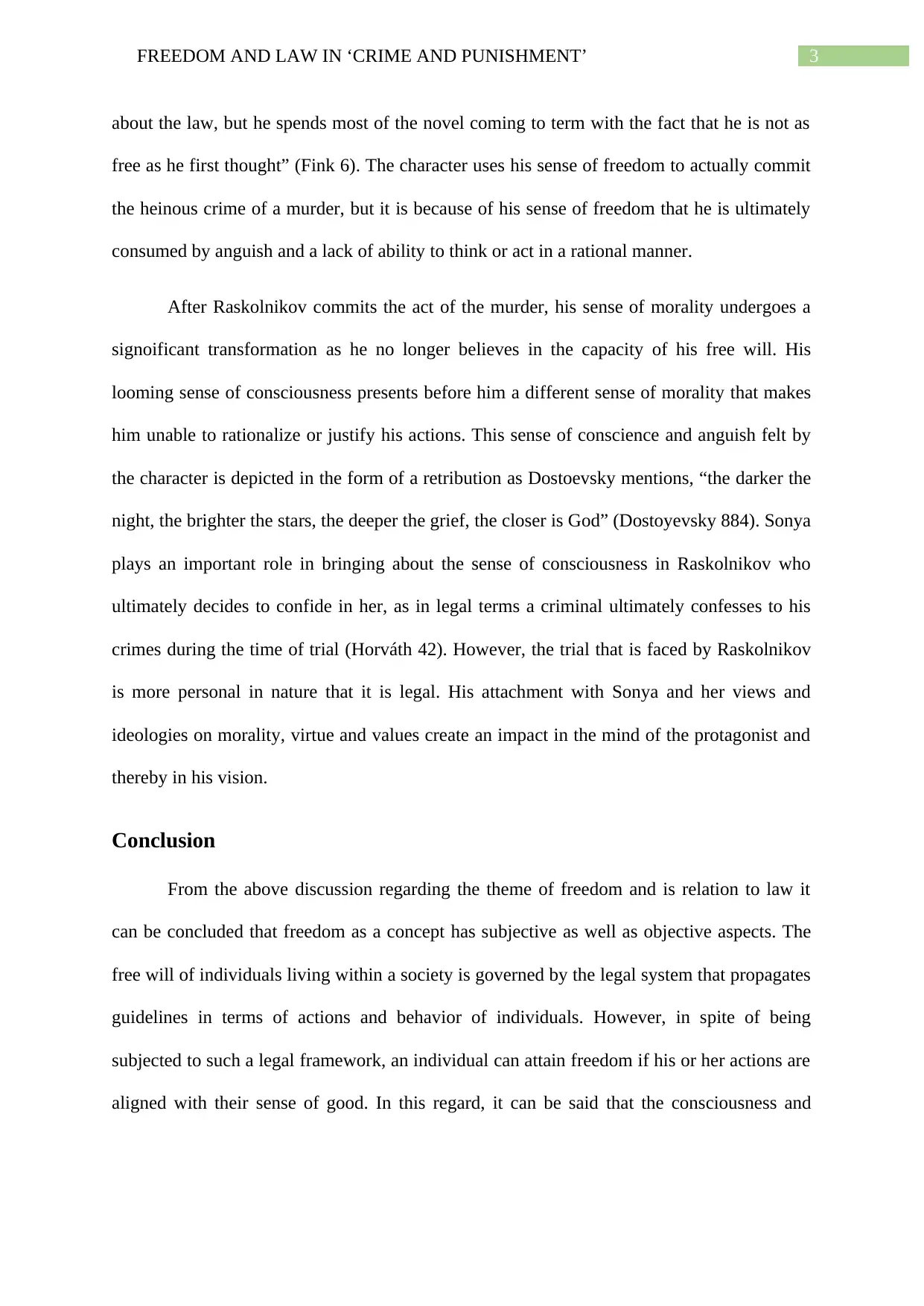
3FREEDOM AND LAW IN ‘CRIME AND PUNISHMENT’
about the law, but he spends most of the novel coming to term with the fact that he is not as
free as he first thought” (Fink 6). The character uses his sense of freedom to actually commit
the heinous crime of a murder, but it is because of his sense of freedom that he is ultimately
consumed by anguish and a lack of ability to think or act in a rational manner.
After Raskolnikov commits the act of the murder, his sense of morality undergoes a
signoificant transformation as he no longer believes in the capacity of his free will. His
looming sense of consciousness presents before him a different sense of morality that makes
him unable to rationalize or justify his actions. This sense of conscience and anguish felt by
the character is depicted in the form of a retribution as Dostoevsky mentions, “the darker the
night, the brighter the stars, the deeper the grief, the closer is God” (Dostoyevsky 884). Sonya
plays an important role in bringing about the sense of consciousness in Raskolnikov who
ultimately decides to confide in her, as in legal terms a criminal ultimately confesses to his
crimes during the time of trial (Horváth 42). However, the trial that is faced by Raskolnikov
is more personal in nature that it is legal. His attachment with Sonya and her views and
ideologies on morality, virtue and values create an impact in the mind of the protagonist and
thereby in his vision.
Conclusion
From the above discussion regarding the theme of freedom and is relation to law it
can be concluded that freedom as a concept has subjective as well as objective aspects. The
free will of individuals living within a society is governed by the legal system that propagates
guidelines in terms of actions and behavior of individuals. However, in spite of being
subjected to such a legal framework, an individual can attain freedom if his or her actions are
aligned with their sense of good. In this regard, it can be said that the consciousness and
about the law, but he spends most of the novel coming to term with the fact that he is not as
free as he first thought” (Fink 6). The character uses his sense of freedom to actually commit
the heinous crime of a murder, but it is because of his sense of freedom that he is ultimately
consumed by anguish and a lack of ability to think or act in a rational manner.
After Raskolnikov commits the act of the murder, his sense of morality undergoes a
signoificant transformation as he no longer believes in the capacity of his free will. His
looming sense of consciousness presents before him a different sense of morality that makes
him unable to rationalize or justify his actions. This sense of conscience and anguish felt by
the character is depicted in the form of a retribution as Dostoevsky mentions, “the darker the
night, the brighter the stars, the deeper the grief, the closer is God” (Dostoyevsky 884). Sonya
plays an important role in bringing about the sense of consciousness in Raskolnikov who
ultimately decides to confide in her, as in legal terms a criminal ultimately confesses to his
crimes during the time of trial (Horváth 42). However, the trial that is faced by Raskolnikov
is more personal in nature that it is legal. His attachment with Sonya and her views and
ideologies on morality, virtue and values create an impact in the mind of the protagonist and
thereby in his vision.
Conclusion
From the above discussion regarding the theme of freedom and is relation to law it
can be concluded that freedom as a concept has subjective as well as objective aspects. The
free will of individuals living within a society is governed by the legal system that propagates
guidelines in terms of actions and behavior of individuals. However, in spite of being
subjected to such a legal framework, an individual can attain freedom if his or her actions are
aligned with their sense of good. In this regard, it can be said that the consciousness and
Paraphrase This Document
Need a fresh take? Get an instant paraphrase of this document with our AI Paraphraser
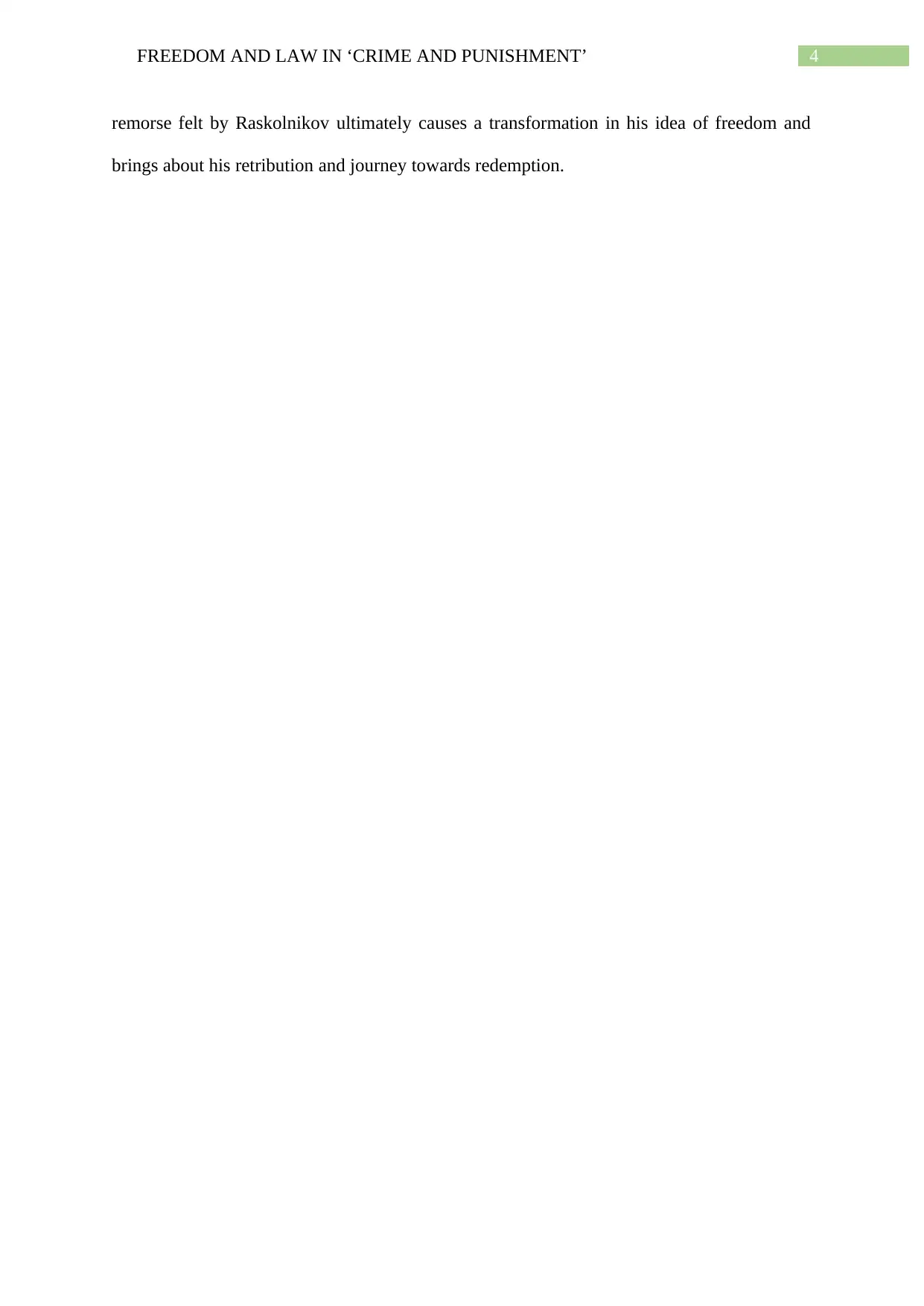
4FREEDOM AND LAW IN ‘CRIME AND PUNISHMENT’
remorse felt by Raskolnikov ultimately causes a transformation in his idea of freedom and
brings about his retribution and journey towards redemption.
remorse felt by Raskolnikov ultimately causes a transformation in his idea of freedom and
brings about his retribution and journey towards redemption.
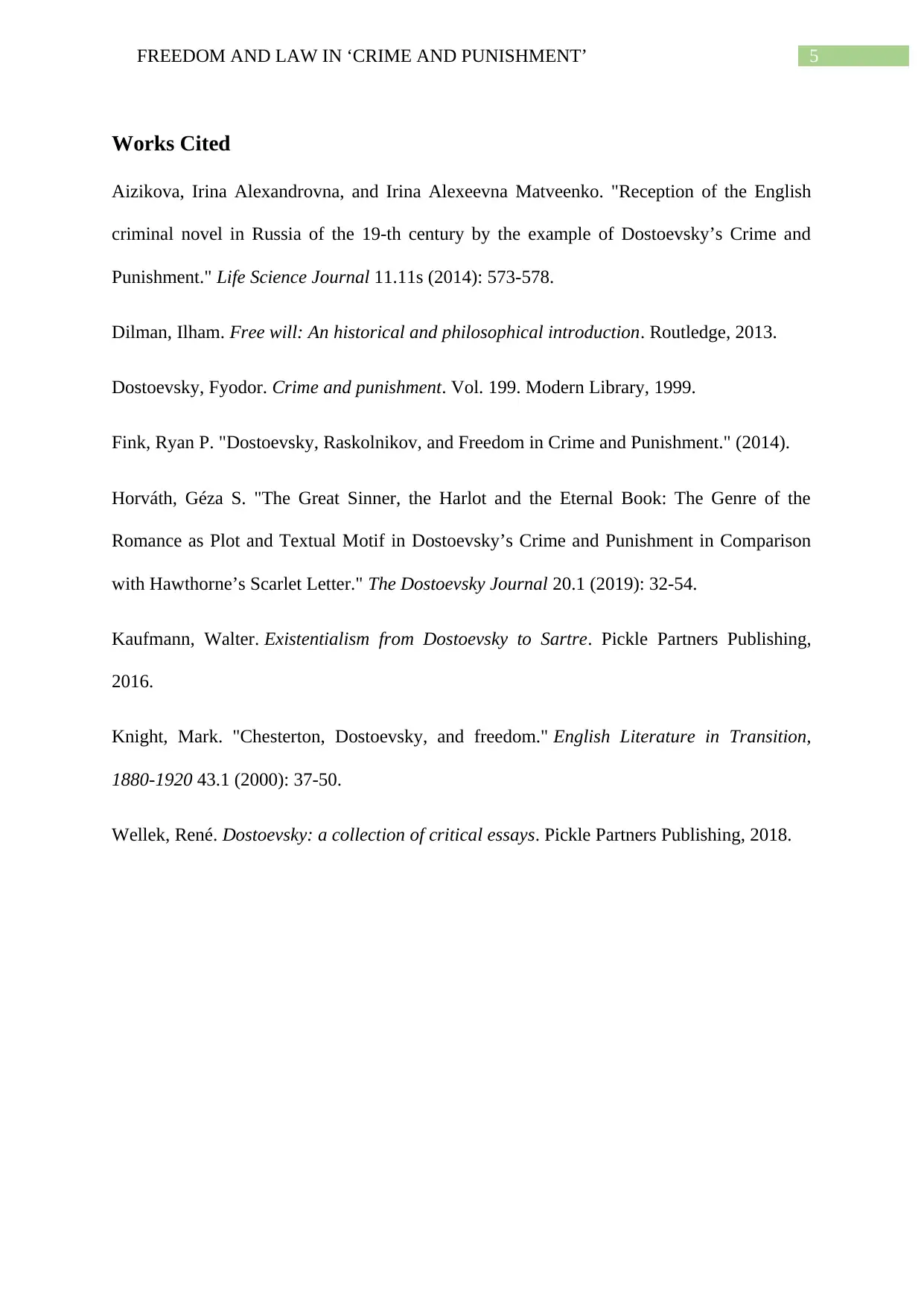
5FREEDOM AND LAW IN ‘CRIME AND PUNISHMENT’
Works Cited
Aizikova, Irina Alexandrovna, and Irina Alexeevna Matveenko. "Reception of the English
criminal novel in Russia of the 19-th century by the example of Dostoevsky’s Crime and
Punishment." Life Science Journal 11.11s (2014): 573-578.
Dilman, Ilham. Free will: An historical and philosophical introduction. Routledge, 2013.
Dostoevsky, Fyodor. Crime and punishment. Vol. 199. Modern Library, 1999.
Fink, Ryan P. "Dostoevsky, Raskolnikov, and Freedom in Crime and Punishment." (2014).
Horváth, Géza S. "The Great Sinner, the Harlot and the Eternal Book: The Genre of the
Romance as Plot and Textual Motif in Dostoevsky’s Crime and Punishment in Comparison
with Hawthorne’s Scarlet Letter." The Dostoevsky Journal 20.1 (2019): 32-54.
Kaufmann, Walter. Existentialism from Dostoevsky to Sartre. Pickle Partners Publishing,
2016.
Knight, Mark. "Chesterton, Dostoevsky, and freedom." English Literature in Transition,
1880-1920 43.1 (2000): 37-50.
Wellek, René. Dostoevsky: a collection of critical essays. Pickle Partners Publishing, 2018.
Works Cited
Aizikova, Irina Alexandrovna, and Irina Alexeevna Matveenko. "Reception of the English
criminal novel in Russia of the 19-th century by the example of Dostoevsky’s Crime and
Punishment." Life Science Journal 11.11s (2014): 573-578.
Dilman, Ilham. Free will: An historical and philosophical introduction. Routledge, 2013.
Dostoevsky, Fyodor. Crime and punishment. Vol. 199. Modern Library, 1999.
Fink, Ryan P. "Dostoevsky, Raskolnikov, and Freedom in Crime and Punishment." (2014).
Horváth, Géza S. "The Great Sinner, the Harlot and the Eternal Book: The Genre of the
Romance as Plot and Textual Motif in Dostoevsky’s Crime and Punishment in Comparison
with Hawthorne’s Scarlet Letter." The Dostoevsky Journal 20.1 (2019): 32-54.
Kaufmann, Walter. Existentialism from Dostoevsky to Sartre. Pickle Partners Publishing,
2016.
Knight, Mark. "Chesterton, Dostoevsky, and freedom." English Literature in Transition,
1880-1920 43.1 (2000): 37-50.
Wellek, René. Dostoevsky: a collection of critical essays. Pickle Partners Publishing, 2018.
⊘ This is a preview!⊘
Do you want full access?
Subscribe today to unlock all pages.

Trusted by 1+ million students worldwide
1 out of 6
Your All-in-One AI-Powered Toolkit for Academic Success.
+13062052269
info@desklib.com
Available 24*7 on WhatsApp / Email
![[object Object]](/_next/static/media/star-bottom.7253800d.svg)
Unlock your academic potential
Copyright © 2020–2025 A2Z Services. All Rights Reserved. Developed and managed by ZUCOL.